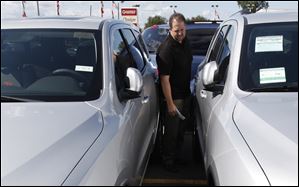
Markets rattle car buyers' confidence
8/19/2011
Jason Ashton looks at a 2012 Dodge Durango at a dealership in Warren, Mich. But the 38-year-old says he's holding out for a price that won't raise his payments and will spend less on options than in the past.
STERLING HEIGHTS, Mich. -- Jeff Swanson was in the market for a new car just a few weeks ago. Then the stock market went crazy.
So the 25-year-old decided to keep his 10-year-old Pontiac Grand Prix at least another year. Gyrations in stocks and talk of a weakening economy rattled Mr. Swanson's confidence about taking on another payment, even though his new job running a home for mentally disabled people seems to be secure.
"Everywhere you turn, other people are saying 'Oh, I lost my job this week. I lost my job last week,' " said Mr. Swanson, who works for a non-profit that gets money from the state. "I want to be a little bit financially set in case something like that happens."
It's an increasingly common reaction among would-be car buyers that has dealers and automakers worried. In May, many believed sales would reach a healthy 13.5 million this year -- halfway between their peak in 2005 and their 30-year low in 2009.
Now, such forecasts seem overly optimistic. Analysts say the swoon in financial markets and economic uncertainty could reduce auto sales by a few percentage points, shrink earnings, and delay hiring in an industry that has been a recent leader in job creation.
"If it keeps going this way, yes, it's going to hurt business," said Jerry Seiner, who runs a group of dealerships in the Salt Lake City area that includes General Motors, Nissan, and Kia.
Any reduction in sales would be especially painful for Toyota and Honda dealers, who are just starting to restock their showrooms after months of shortages brought on by Japan's earthquake.
But dealers say sales likely won't collapse in the second half of 2011, as they did in 2009. That's because banks are lending more freely, and lease deals, which went away during the recession, are making a comeback. Also, older cars still will need to be replaced. The average age of cars in the United States is 10.6 years, up more than a full year from 2008, according to the research firm Polk.
Indeed, the turmoil in financial markets isn't scaring off everyone.
Jason Ashton, 38, of Shelby Township, Michigan, plans to trade in his 2006 Dodge Ram pickup for a roomier SUV that will fit his wife, two kids and equipment.
"You've got to have room for the family," he said, trying to swing a deal for a Durango at Van Dyke Dodge in Warren, Mich.
But Mr. Ashton, who installs software for auto companies, will buy only if he gets a price low enough to keep his monthly payment steady. He also won't spend as much on options as in the past, forgoing leather seats, for example.
J.D. Power and Associates cut its 2011 sales forecast last week by 2 percent, to 12.6 million new cars and trucks. It cut its 2012 forecast by 3 percent, to 14.1 million.
Ford Motor Co. is sticking with its sales forecast of about 13 million for the year.